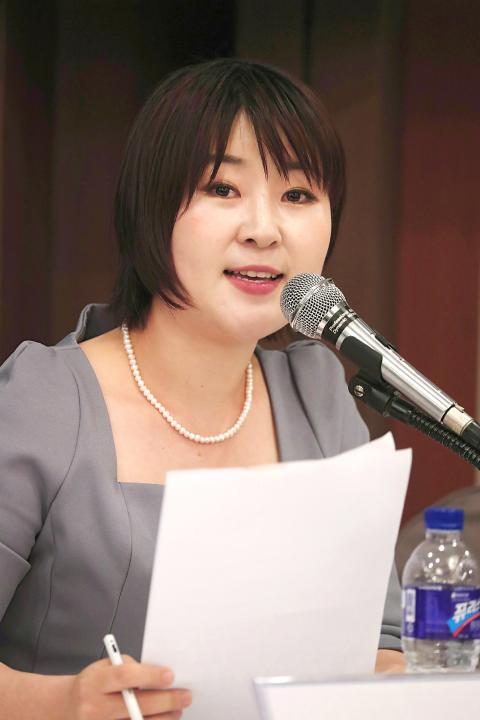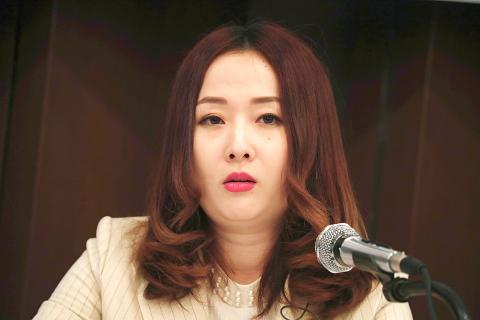North Koreans are forced to pay bribes to officials to survive in their isolated country where corruption is “endemic” and repression rife, the UN human rights office said yesterday in a report that Pyongyang dismissed as politically motivated.
The report said officials extorted money from a population struggling to make ends meet, threatening them with detention and prosecution — particularly those working in the informal economy.
North Korea rejected the report, saying that it was “politically motivated for sinister purposes.”

Photo: EPA-EFE
“Such reports are nothing more than fabrication ... as they are always based on the so-called testimonies of ‘defectors’ who provide fabricated information to earn their living or are compelled to do so under duress or enticement,” its Geneva mission said in a statement.
Pyongyang blames the dire humanitarian situation on UN sanctions imposed for its nuclear and ballistic missile programs since 2006, but the report said that the military receives priority funding amid “economic mismanagement.”
“I am concerned that the constant focus on the nuclear issue continues to divert attention from the terrible state of human rights for many millions of North Koreans,” UN High Commissioner for Human Rights Michelle Bachelet said in a statement.

Photo: EPA-EFE
“The rights to food, health, shelter, work, freedom of movement and liberty are universal and inalienable, but in North Korea they depend primarily on the ability of individuals to bribe State officials,” she said.
Four in 10 North Koreans, or 10.1 million people, are chronically short of food and further cuts to already minimal rations are expected after the worst harvest in a decade, a UN assessment said earlier this month.
“The threat of arrest, detention and prosecution provide State officials with a powerful means of extorting money from a population struggling to survive,” the UN rights office report said.
Bribery is “an everyday feature of people’s struggle to make ends meet,” said the report, entitled “The price is rights.” It denounced what it called a “vicious cycle of deprivation, corruption and repression.”
It is based on 214 interviews with North Korean “escapees,” mainly from the northeastern provinces of Ryanggang and North Hamgyong, bordering China.
They were the first to be cut from the public distribution system that collapsed in 1994, leading to a famine estimated to have killed up to 1 million, it said.
“As my father still had to work at a state firm that could no longer afford giving rations, we survived by selling taffy and liquor my mom made,” Ju Chan-yang, a 29-year-old defector, told a news conference hosted by the UN office in Seoul.
Ju, who defected to the South in 2011, said she also made a living by selling banned South Korean and US products in the underground economy. Sometimes she had to bribe authorities.
“If you get caught and don’t have bribes to pay, you could get executed, just like my relatives,” she said.
Many North Koreans pay bribes of cash or cigarettes not to have to report to state-assigned jobs where they receive no salary, thus allowing them to earn income in rudimentary markets, the report said.
Others bribe border guards to cross into China, where women are vulnerable to trafficking into forced marriages or the sex trade, it said.
“North Korea is a society where all of its members are involved in corruption because they’re forced to do illegal acts only to survive,” said Lee Han-byeol, who came to the South in 2001 and now runs a group that helps defectors.

A fire caused by a burst gas pipe yesterday spread to several homes and sent a fireball soaring into the sky outside Malaysia’s largest city, injuring more than 100 people. The towering inferno near a gas station in Putra Heights outside Kuala Lumpur was visible for kilometers and lasted for several hours. It happened during a public holiday as Muslims, who are the majority in Malaysia, celebrate the second day of Eid al-Fitr. National oil company Petronas said the fire started at one of its gas pipelines at 8:10am and the affected pipeline was later isolated. Disaster management officials said shutting the

US Vice President J.D. Vance on Friday accused Denmark of not having done enough to protect Greenland, when he visited the strategically placed and resource-rich Danish territory coveted by US President Donald Trump. Vance made his comment during a trip to the Pituffik Space Base in northwestern Greenland, a visit viewed by Copenhagen and Nuuk as a provocation. “Our message to Denmark is very simple: You have not done a good job by the people of Greenland,” Vance told a news conference. “You have under-invested in the people of Greenland, and you have under-invested in the security architecture of this

Japan unveiled a plan on Thursday to evacuate around 120,000 residents and tourists from its southern islets near Taiwan within six days in the event of an “emergency”. The plan was put together as “the security situation surrounding our nation grows severe” and with an “emergency” in mind, the government’s crisis management office said. Exactly what that emergency might be was left unspecified in the plan but it envisages the evacuation of around 120,000 people in five Japanese islets close to Taiwan. China claims Taiwan as part of its territory and has stepped up military pressure in recent years, including

UNREST: The authorities in Turkey arrested 13 Turkish journalists in five days, deported a BBC correspondent and on Thursday arrested a reporter from Sweden Waving flags and chanting slogans, many hundreds of thousands of anti-government demonstrators on Saturday rallied in Istanbul, Turkey, in defence of democracy after the arrest of Istanbul Mayor Ekrem Imamoglu which sparked Turkey’s worst street unrest in more than a decade. Under a cloudless blue sky, vast crowds gathered in Maltepe on the Asian side of Turkey’s biggest city on the eve of the Eid al-Fitr celebration which started yesterday, marking the end of Ramadan. Ozgur Ozel, chairman of the main opposition Republican People’s Party (CHP), which organized the rally, said there were 2.2 million people in the crowd, but